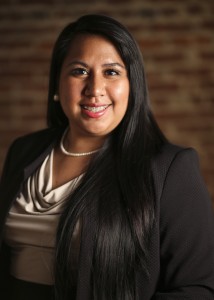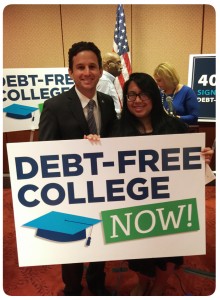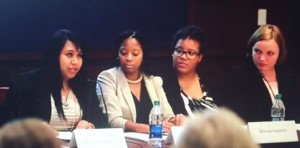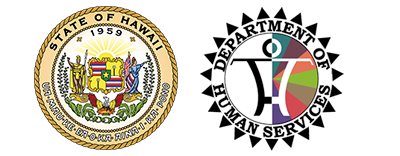Hawaii Foster Youth Makes Good from Hawaii to D.C.
Posted on Nov 18, 2015 in Main In the summer of 2015, Brianne Lyn Nagamine was the first Hawaiʻi foster youth to be accepted to the competitive Congressional Coalition on Adoption Institute (CCAI) Foster Youth Internship Program. Nagamine interned with Sen. Brian Schatz. Nagamineʻs road to D.C. and back has spanned her whole life.
In the summer of 2015, Brianne Lyn Nagamine was the first Hawaiʻi foster youth to be accepted to the competitive Congressional Coalition on Adoption Institute (CCAI) Foster Youth Internship Program. Nagamine interned with Sen. Brian Schatz. Nagamineʻs road to D.C. and back has spanned her whole life.
At age three, Nagamine lost her father to suicide. After that, Nagamine lived in a home riddled with drugs, alcohol, and domestic violence until she was placed in foster care a few years later. After four years in the foster care system, Nagamine’s paternal grandparents adopted her. She graduated from Kauaʻi High School and moved to Oʻahu in 2012.
Nagamine’s early path, though rocky, was supported by her grandparents as well as assistance from the Department of Human Services Child Welfare Service Branch. CWS provides assistance for higher education as well as other expenses like clothes and transportation to medical coverage for youth like Nagamine.
Nagamine recognized early on though that continuing on her path to success would be hard work. “At one point, I was attending Kapiʻolani Community College (KCC) on Oʻahu and working three jobs just to support myself,” says Nagamine.
While attending KCC, Nagamine began volunteering with the Hawaiʻi Foster Youth Coalition (HFYC) Oahu Board and the Kids Hurt Too Hawaii organization.
Kids Hurt Too Hawaiʻi offers kids a safe space to express feelings about their loss of a parents to divorce, adoption, foster care, incarceration or death. “When foster youth experience grief and trauma,” Nagamine writes, “what they really need is peer-to-peer support groups that allow other like-minded youths to have empathy for one another rather than having one-on-one therapy,” says Nagamine.
“As the first person from Hawai‘i to participate in the Foster Youth Internship Program, she has also raised much-needed awareness of the challenges foster youth face today in our state.” – Sen. Brian Schatz
KCC was not Nagamineʻs first introduction to HFYC. As a teenager, she was invited to attend the “REAL WORLD” event on Kauai. “HFYC helped me learn basic living skills and provided a family that wasn’t available previously. All of us faced struggles but were striving for the best,” Nagamine explains. “We inspired and motivated each other when feeling down. Without this group I would not have been able to graduate from high school or transition to college on a different island.”
Nagamine Lands on Capitol Hill
In the summer of 2015, Nagamine began her internship in the Washington D.C. office of Senator Brian Schatz with CCAI. The CCAI seeks to educate and inform members of Congress about adoption, foster care, and child welfare issues that affect their constituents. The Institute’s work is funded entirely by donations and gifts.
Nagamine hit the ground running with responsibilities like attending briefings on health and human services topics including child welfare, adoption, foster care, Adverse Child Experience (ACE), juvenile justice, child labor, cancer, informed health care, homelessness, debt-free college, and Native community issues. Nagamine also wrote briefing summaries, drafted letters to the chairman, vice chairman and Senator Schatz’s colleagues to support proposed legislation and led tours around the Capitol Visitorsʻ Center.
“I appreciate Brianne’s contributions to our DC office and thank her for sharing her inspirational story to help others,” said Senator Schatz. “Brianne has not only gained valuable experience interning in my Senate office, but as the first person from Hawai‘i to participate in the Foster Youth Internship Program, she has also raised much-needed awareness of the challenges foster youth face today in our state.”
Nagamine even wrote her own policy paper entitled “Every Life Matters: Trauma-Informed Training and Peer-to-Peer Support Groups to Prevent Foster Youth and Alumni Suicide” to fulfill her requirements for the internship. She presented her policy recommendations to members of Congress at the White House.
The experience meant a lot to Nagamine. “I am so honored to be able to represent Hawaiʻi. It really amazes me that a local girl coming from the small island of Kauaʻi experiencing many traumatic events throughout her life, and being put into the foster care system, not knowing if a future was even an option, can be here today in D.C. and advocating for the child welfare system,” she said during her summer in D.C.
“When foster youth experience grief and trauma … what they really need is peer-to-peer support groups that allow other like-minded youths to have empathy for one another rather than having one-on-one therapy.”
The internship also highlighted an important piece of her advocacy work: healing from trauma. “I believe foster youth, foster parents, social workers, and other professional working with at-risk youths should be trained on the impact of trauma (physical, emotional, and sexual abuse, neglect, abandonment, domestic violence). Discussions need to raise awareness about suicide and how trauma is the cause of many suicidal deaths of children every day. [CCAI] helps youths like me better understand the trauma we experience and how that trauma affects our behavioral and brain development,” she wrote in the summer.
Advocacy Continues
Nagamine returned after her internship to begin her studies at the University of Hawaiʻi at Mānoa. She is pursuing a bachelor of social work. When DHS staff spoke with her earlier in the summer, Nagamine was unsure if she would have permanent place to stay.  Thankfully, when she returned, her boyfriendʻs family welcomed her with open arms. They commute to school together everyday.
Thankfully, when she returned, her boyfriendʻs family welcomed her with open arms. They commute to school together everyday.
Nagamine’s passion for advocacy seems to burn just as bright as when she was in D.C. In addition to going to school, Nagamine is “working hard, planning events for foster youth, doing peer support groups with Kids Hurt Too for children in care and children separated from a loved one.” She has also joined the the Hawaiʻi Tobacco Coalition as a Truth Initiative Fellow on the national level.
Nagamineʻs work continues to reach beyond Hawaiʻi and it continues to address the effect of trauma on young people. She has been back to D.C. twice since she returned. Once was to accept a $1,000 grant for Kids Hurt Too and HYCF as a national ambassador. The grant helps create a peer support group “so that they can heal with trauma and prevent self-harm.”
“If it’s something stressful, reach out to someone. If it’s something someone can help me with, ask for help because that’s really important.”
Nagamineʻs next trip to D.C. was a part of the Leaders in Change Conference with the Foster Youth in Action. Nagamine was joined by three other foster youths. The four of them led a workshop called “Your Life YOUth Matter.” The workshop, for approximately 25 other youths, again addressed trauma and its impacts and solutions for self-care. As part of the conference, Nagamine even got to speak on a Senate panel again.
Advocacy work here in the Islands – whether for foster youth in general or as a Truth Initiative Fellow – is also important for Nagamine. When DHS staff caught up with her, Nagamine said she had just presented to the Keiki Caucus and was preparing to present at a conference in Mississippi to youths about the risk factors for tobacco.
Learning Balance Amid Responsibilities
When asked how Nagamine juggles all of her commitments, whether in school, advocacy or to fellow former and current foster youths, Nagamine seemed to practice what she preaches.
“Self-care is really important to me. You know, taking the time out of the day to focus on yourself,” says Nagamine.
The 20-year-old remarks that it is’t always easy to practice what she preaches. “I still have to remind myself and practice that everyday. One thing I’ve always taken to heart is being honest with myself,” says Nagamine. “If it’s something stressful, reach out to someone. If it’s something someone can help me with, ask for help because that’s really important,” advises Nagamine.
“It really amazes me that a local girl coming from the small island of Kauaʻi experiencing many traumatic events throughout her life, and being put into the foster care system, not knowing if a future was even an option, can be here today in D.C. and advocating for the child welfare system.”
Nagamine’s support system helps her in her quest for self-care. “I’m glad that I have a really good support system that constantly reminds me to put myself first,” says Nagamine.
After all these years, and the long road behind her, Nagamine’s support system still gives her strength and leads her forward. In addition to her boyfriend and his family who welcomed her into their home, Nagamine’s grandparents, who are long retired and live on a fixed income, have remained supportive over the years.
Nagamine realizes hard work and responsibility are integral to her life. “Yes, I know I have a really busy schedule. It’s almost like I’ve used this as a coping mechanism … being involved is always what I’ve done, taking on responsibility,” she says.
It’s hard to believe that someone so young could have so much self-awareness mixed with raw passion. Even when understanding her coping mechanisms, she pushes forward with self-care and self-improvement first. “Sometimes delegating is hard, but I’ve been working on that,” Nagamine quickly admits.
After just 20 years on this earth, Nagamine exudes wisdom beyond her years and lessons that even adults need reminding of. Still, her voice swells with the exuberance of a young woman with a long and illustrious road ahead of her. The DHS CWS will continue to provide Nagamine support, and we canʻt wait to see how far she goes.
support they can offer children and families.
